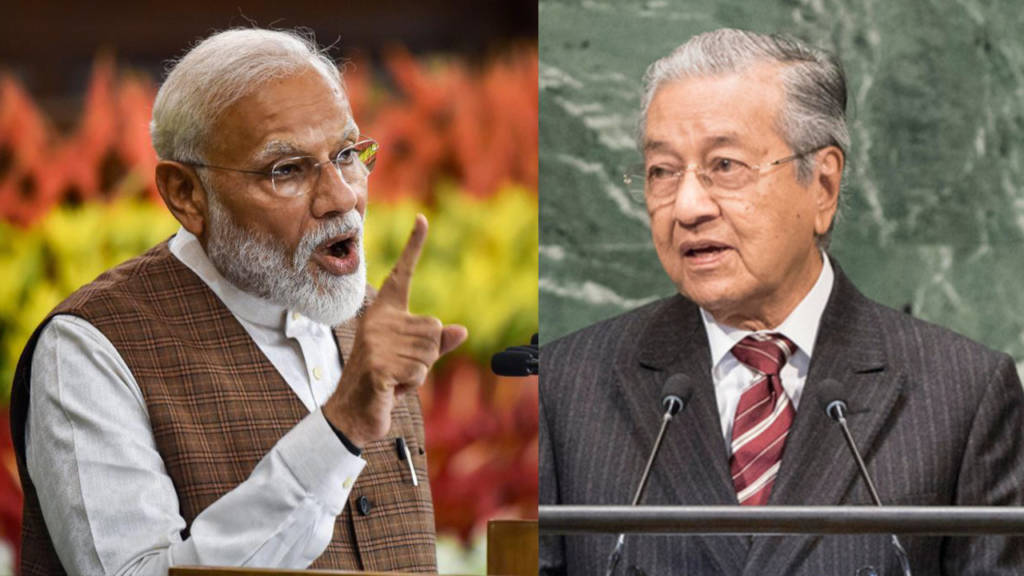Joining in the meek attempts of the Pakistani administration to churn dissension around legislative developments in the Indian region of Jammu, Kashmir and Ladakh is the Malaysian Prime minister Mahathir Bin Mohamad; who by is vile anti-India rhetoric at the 74th UNGA has certainly invited a firm Indian response.
“Now, despite the UN resolution on Jammu and Kashmir, the country has been invaded and occupied,” he said in his address to the 74th UNGA essentially toeing the line of radical elements operating in the region.
Apart from factual inaccuracies and reeking anti-India bias, Mahathir Bin Mohamad’s comments have certainly irked Indians who have been calling for a firm Indian response given his support for Pakistan which has been bleeding India and other neighbouring countries through terrorist attacks being orchestrated from Pakistani sovereign territory.
However, for Malaysia, this anti-India stance can soon translate into an economic nightmare, given its close economic ties with the $3 trillion Indian economy.
Tourism which forms a major part of the Malaysian economy has been contributed heavily by Indian tourists who visit the south-east Asian nation in lakhs every year.
Only in 2019, around 6.8 lakh, Indian tourists are expected to visit Malaysia, the number which pitched around 4.37 lakhs between January and September of 2018.
“India is one of the top 10 source markets for Malaysia. We are expecting 6,83,000 visitors from India in 2019,” Tourism Malaysia Package Development Division Director Tuan Syed Yahya Syed Othman had told reporters.
In this scenario change in tourist patterns from India can severely impact the Malaysian economy.
Bilateral trade between the two nations stands at around a whopping $12 billion, with imports from Malaysia to India being on a rising trend over the past few years. The Free trade agreement signed between the two governments in 2011 had also given a massive push to the bilateral trade.
Since the same year, custom duty on more than 1200 products has also been reduced or removed completely. As of today, Palm oil is one of the major products exported by Malaysia to India and is a significant portion of the bilateral trade between the two nations; however given the aggressive nature of Malaysian PM at the UNGA any move by India to revise its import policies regarding Palm oil will significantly impact the related industry in Malaysia.
India had recently increased the import duty on Palm oil by 5% and any further increase would once and for all cripple Malaysian palm oil exports to India.
Besides, various reports have also suggested that palm oil is dangerous for health and consuming it can make people prone to more cardiovascular diseases. Being cheap also makes palm oil ideally suited for adulterating other oils, from mustard and groundnut to sesame. It is a neutral oil, with no aroma of its own and can easily mingle with other oils.
Thousands of Indians working in Malaysia also contribute massively to its economy. In the year 2011 Malaysian government had decided to recruit 45,000 Indian workers in a bid to overcome the shortfall of employees in various businesses in Malaysia, Malay Human Resources Minister S Subramanian had said.
Now in such scenario, any move by Indian administration to discourage Indian nationals to work in Malaysia will have severe consequences on Malaysian industries.
Malaysian industries have also been working closely with India in critical fields of Information Technology and defence. India and Malaysia had also signed three important agreements for cooperation in the field of cyber-security, cultural exchange and administration with a view to further deepening defence, economic and cultural relations and now considering the current geo-political developments any hindrance to transfer of these technologies to Malaysia would be highly detrimental to Malaysian companies and their employees.
Nonetheless now the recent pro-Pakistani comments by Malaysian Prime Minister are surely not in line to keep the relation between the two nations cordial and certainly, Malaysia is not only poised to be economically impacted but might also have to pay a higher price for toeing the line of radical terrorists.
